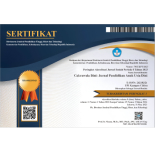National Curriculum Development: Should Teachers be Engaged in Developing it?
Abstract
Keywords
Full Text:
PDFReferences
Alfrey, L., O'Connor, J., and Jeanes, R. (2017). Teachers as policy actors: Co-creating and enacting critical inquiry in secondary health and physical education. Physical Education and Sport Pedagogy, 22(2), 107-120.
Alnefaie, S. K. (2016). Teachers’ role in the development of EFL curriculum in Saudi Arabia: The marginalised status. Cogent Education, 3(1), 1-14.
Batiste, W., Walker, S., and Smeed, J. (2015). The relationship between teachers' perceptions of school leadership and their perceptions of the implementation of the national curriculum. Leading and Managing, 21(1), 69-85.
Bolghari, M. S., and Hajimaghsoodi, A. (2017). Action research as a bottom-up approach to foster teacher involvement in language curriculum change. Journal of Language Teaching and Research, 8(2), 362-369
Brennan, M. (2011). National curriculum: A political-educational tangle. Australian Journal of Education, 55(3), 259-280.
Cheung, A. C., and Man Wong, P. (2011). Effects of school heads' and teachers' agreement with the curriculum reform on curriculum development progress and student learning in Hong Kong. International Journal of Educational Management, 25(5), 453-473.
Huizinga, T., Handelzalts, A., Nieveen, N., and Voogt, J. M. (2014). Teacher involvement in curriculum design: Need for support to enhance teachers’ design expertise. Journal of curriculum studies, 46(1), 33-57.
Kobiah, L. K. (2016). Teachers' perspective towards their involvement in selection and organization of learning experiences and implementation of secondary school curriculum in Kenya. Journal of Education and Practice, 7(28), 53-59.
McFadden, J. R., and Roehrig, G. H. (2017). Exploring teacher design team endeavors while creating an elementary-focused STEM-integrated curriculum. International Journal of STEM Education, 4, 1-22.
Mouraz, A., Leite, C., and Fernandes, P. (2013). Teachers’ role in curriculum design in Portuguese schools. Teachers and Teaching, 19(5), 478-491.
Ormond, B. M. (2017). Curriculum decisions–the challenges of teacher autonomy over knowledge selection for history. Journal of Curriculum Studies, 49(5), 599-619.
Petrie, K., and McGee, C. (2012). Teacher professional development: Who is the learner?. Australian journal of Teacher education, 37(2), 59-72.
Tsafos, V. (2013). Developing the curriculum in an innovative greek school framework: The implication of teachers. Journal of Curriculum and Teaching, 2(1), 42-53.
Viirpalu, P., Krull, E., and Mikser, R. (2014). Investigating estonian teachers’ expectations for the general education curriculum. Journal of Teacher Education for Sustainability, 16(2), 54-70.
DOI: https://doi.org/10.17509/cd.v13i2.52315
Refbacks
- There are currently no refbacks.
Copyright (c) 2022 UPI Kampus Cibiru

This work is licensed under a Creative Commons Attribution-ShareAlike 4.0 International License.
Cakrawala Dini: Jurnal Pendidikan Anak Usia Dini
Published in collaboration Program Studi PGPAUD UPI Kampus Cibiru, APG PAUD Indonesia, and PPJ PAUD Indonesia

Cakrawala Dini: Jurnal Pendidikan Anak Usia Dini is licensed under a Creative Commons Attribution-ShareAlike 4.0 International License.
Based on a work at https://ejournal.upi.edu/index.php/cakrawaladini.














